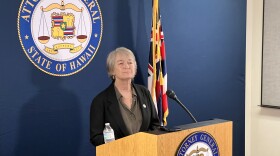Last week, historic wildfires tore across Maui and destroyed Lāhainā Town. It is the deadliest wildfire in modern U.S. history, claiming over 100 lives. As crews search the disaster zone for remains, Gov. Josh Green said there will be more tragedy to come.
“We, of course, are racing against time to make sure that we do all that we can to recover our lost loved ones,” he said.
Green told The Conversation that he visited the Maui morgue on Wednesday. He wanted to understand what recovery professionals and firefighters are experiencing.
“It's unlike anything we've dealt with as a state before. And this will be the pivotal point in our history,” he said.
“I want to tell people, there are a lot of things all happening at once. And I appreciate both their understanding and their compassion.”
Green addressed the controversy surrounding Kaleo Manuel, former deputy director of the Commission on Water Resource Management.
Manuel has been criticized for waiting to release water to landowners during the fire. The criticism has sparked outrage within the Native Hawaiian community. The Department of Land and Natural Resources said Manuel has been reassigned.
“I'm not going to impugn anyone, and I'm not going to blame anyone during this process. But sometimes ... people go in and do other things so that their replacements or the other people in their department have the full capacity to do what's necessary,” Green said.
“And if we're arguing ... that's work that can't be done.”
Green also talked about the debate surrounding the Emergency Alert System on Maui. Herman Andaya, leader of the Maui Emergency Management Agency, recently stated that he stands by his decision not to deploy sirens during the fire.
The sirens are mainly used for tsunami warnings. Andaya said he worried that people in Lāhainā would think there was a tsunami and head toward the mountains, where the fire blazed.
When HPR asked whether officials should have used the alert system, Green responded, “Yes, I would say absolutely.”
“We have to alert people if there's a tragic emergency coming,” he continued. “[If] there was any emergency, whether it was a tsunami or a fire or a hurricane or an earthquake that was occurring, of course I would want some form of alert.”
Green clarified that, in the case of The Lāhainā fire, sounding the alarms “could have definitely led to even more loss of life,” but “if we do have a storm, in the immediate future, you can imagine that we will be sounding every alarm, and then doing all the other additional communications.”
Andaya resigned from his MEMA position Thursday afternoon, citing health reasons.
Moving forward, Green wants people to know that West Maui is no place for visitors, but believes other Hawaiian islands will keep the tourism industry running. He hopes the state can find a balance between caring for people affected by the fires and encouraging travel to the state.

“If you're on the mainland, and you say, 'I'm taking a vacation to Maui,' it's going to strike everyone as more than insensitive; it's going to sound cruel. And that's understandable and real,” Green said.
“But in the coming months, we will want to send the message very clearly that people should still travel to Hawaiʻi in general.”
Green also described the wildfires as the start of the state's battle against a changing climate.
“We are all in real time reviewing what it means to be in an era of extreme climate change and dry conditions,” he said.
“If it's dry season when we have a hurricane coming, [there are] so many things to consider. And that's going on in parallel with the relief effort to find our lost loved ones.”
This interview aired on The Conversation on August 17, 2023. The Conversation airs weekdays at 11 a.m. on HPR-1. This interview was adapted for the web by Emily Tom.







